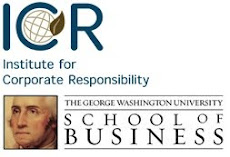I generally don’t like cubicles. Before I started my MBA at the George Washington University, I spent five years working at a cubicle. When I left my job in public accounting, I was relieved at the thought of abolishing cubicles from my life forever. But now as a 2010 EDF Climate Corps fellow at PHH Arval, I have never been so proud to have my very own cubicle. In fact, I don’t even call it a cubicle – this is now my workstation. I’ve even decorated it with EDF and Net Impact signs. I think the reason for my renewed enthusiasm for office life is that I have never felt more passionate about my work.
As an EDF Climate Corps fellow, I am responsible for making the business case for sustainability. I’m helping my host company, PHH Arval, simultaneously improve its bottom line while increasing environmental performance. This win-win situation is created by recommending projects that reduce energy usage and in turn lower utility bills in a commercial office building while cutting harmful greenhouse gas emissions.
PHH takes sustainability seriously. Their award-winning PHH GreenFleet program, for example, works with many of today’s leading transportation companies to encourage less fuel consumption, more efficient driving and the improvement of fuel economy for fleets. PHH also practices what it preaches. Through the dedication of an environmentally conscious facilities department and the commitment of a voluntary Green Team, PHH has already reduced electricity consumption by 20 percent in the past 5 years, obtained an EnergyStar rating that puts it in the top 25 percent of all office buildings in its class and is well on its way to meeting its Environmental Protection Agecny Climate Leaders goal.
Even for such an environmentally responsible organization, I am finding that significant opportunities for lowering energy consumption still remain in all the primary areas of the office building. As I learned during EDF’s week-long Climate Corps training, “low-hanging fruit always grows back.” So, even for the most environmentally conscious organizations, a renewed look at energy consumption is bound to turn up new opportunities to save money as technology changes, cost barriers drop and new standards, regulations and incentives are offered.
- The installation of occupancy sensors in closed spaces
- Daylight harvesting to take advantage of the natural light that flows in through the wall-to-wall windows
- A review of nighttime and weekend lighting policies
Furthermore, I’ve been thinking about data centers. EDF organizes weekly expert calls by leaders in energy efficiency. On one of those calls, Don Beaty, a lead consultant for datacom facilities and designer for all Google data centers worldwide, explained that there is absolutely no reason for data centers to be cooled to a frigid 68 degrees or lower. Instead, ASHRAE environmental specifications allow for the intake temperature to be set as high as 80 degrees without risk to equipment and without impacting performance. Before the call took place, I reserved a conference room and invited the IT managers from PHH to attend. The message about temperatures in data centers immediately reached its intended audience from a very credible source. Now, I’m working with the energy-conscious IT department to increase the temperature in the data centers at PHH. I am currently working on quantifying the savings from this increase; which I believe will be substantial.
As this example illustrates, energy efficiency is easy money and good business. While there is no upfront cost of increasing the temperature set-point in a data center, some of the other projects I am considering do require an initial investment. Yet, by analyzing these projects from a financial perspective, just like a company does with any other investment they make, I am finding that these projects are smart business ventures with high returns, low risk and quick pay-backs. So, as a business student and environmentalist, I’m proud to sit at the energy efficiency cubicle, formed by the benefits these projects have on the environment, energy usage and to a company’s bottom line.




